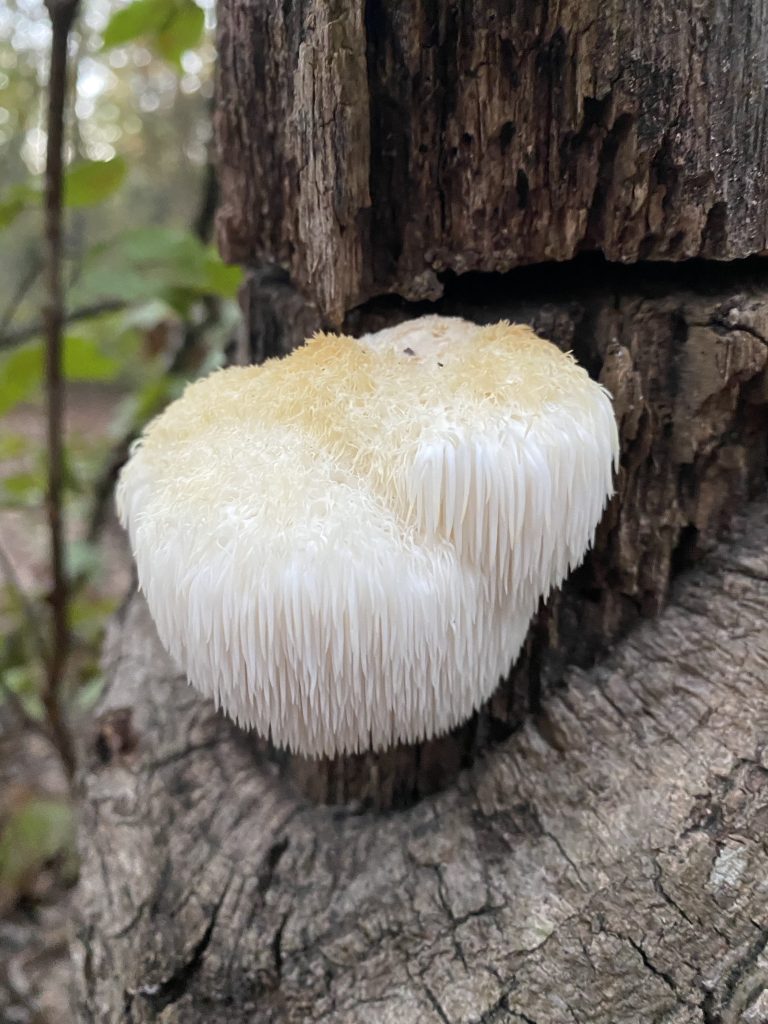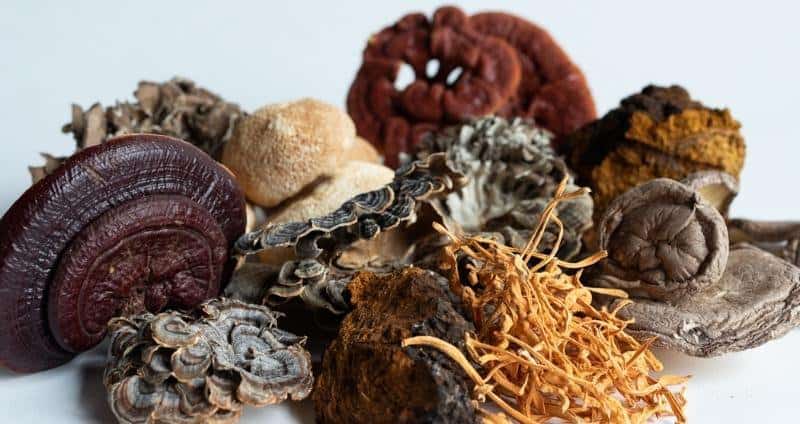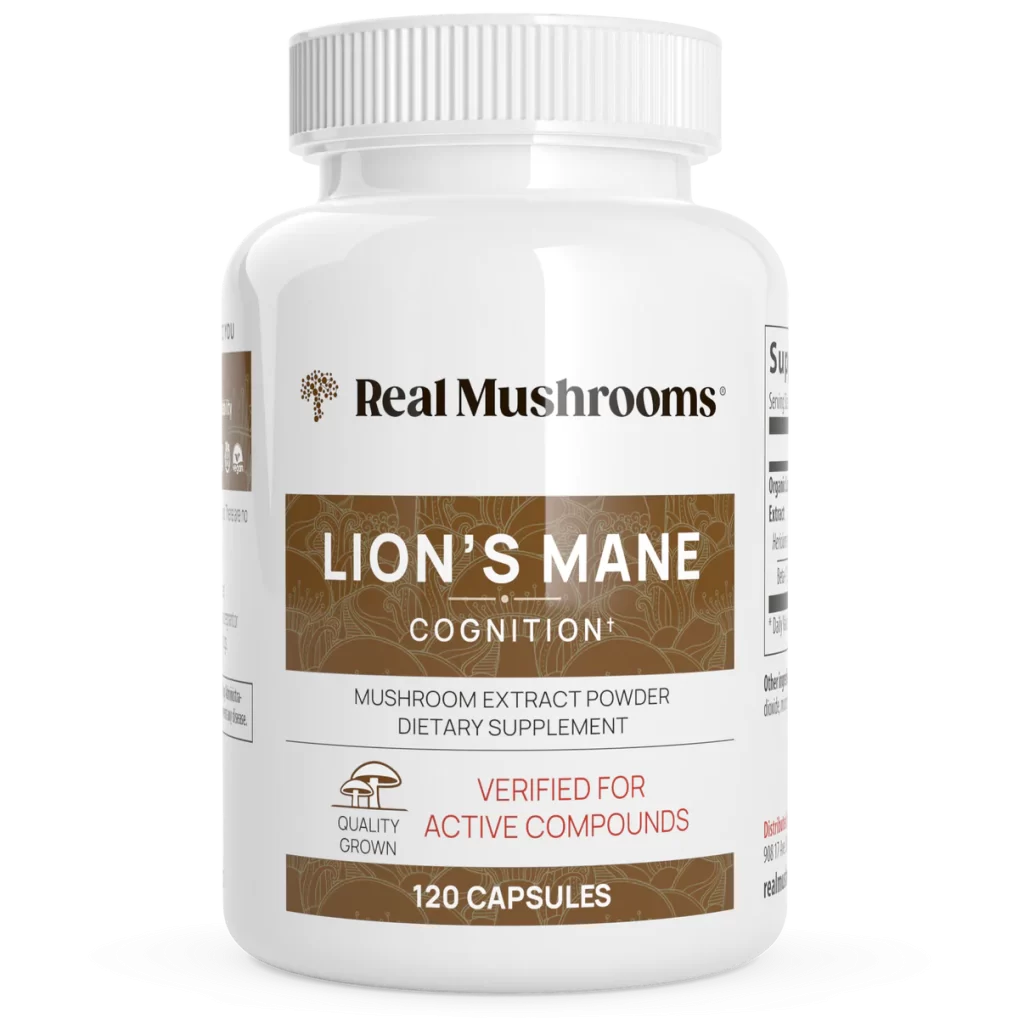Lion’s Mane for Brain Health
As you know, mushrooms are the new ‘it’ supplement. That’s because they offer a broad range of immune, cognitive, and energy-enhancing benefits.
One mushroom worth understanding is Lion’s Mane, distinctive for both its appearance and brain enhancing properties. In this article, I’ll explore it’s history and some of the current research supporting claims that Lion’s Mane supports brain health, positively affects mood, and contributes to better sleep. Read on to learn more.

Lion’s Mane in Chinese Medicine
Lion’s Mane has a long history of being used as a brain-boosting supplement. Chinese Buddhist monks used Lion’s Mane powder in their tea, claiming it helped them focus in their meditation and increase overall brain power.
According to TCM, it’s nutritious for all five internal organs – liver, spleen, lung, heart, and kidney. Hou Tou Gu, as they refer to it in China, was historically used to fortify the spleen, nourish the gut, and even fight cancer. The mushroom is also hailed to combat the deficiency of Qi, or “life force”. 1
Mostly known as a wild foraged mushroom, the cultivation of Hericium was first reported in China in 1988. It is now widely grown indoors on substrate such as hardwood sawdust as interest in its health benefits has exploded.
Research Highlights
Lion’s Mane has been studied extensively for it’s benefits in the key areas of cognitive health and brain function, emotional health, sleep, and blood sugar management. Here are some highlights below.
Dosage
Research studies support varying daily doses (250mg-1000mg) of Lion’s Mane. I recommend 1000mg daily, taken with food.
BRAIN HEALTH
Compounds called hericenones and erinacines, when extracted and isolated from Lion’s Mane, have qualities that may protect neurons and nerves in our bodies. The unique neuroprotective effects of these Lion’s Mane compounds are speculated to shield the brain from normal mild cognitive decline associated with aging (22).
A study on healthy middle aged individuals using Lion’s Mane also showed beneficial results of improving cognitive function and short term memory (42). Lion’s Mane has potential for promotion of cognitive health based on these findings.
STRESS & ANXIETY
Animal studies have shown Lion’s Mane to support healthy neuron production in the hippocampus, the part of the brain that regulates emotions. This may support a positive mood and relieve occasional stress (35). A small clinical trial out of Japan found that Lion’s Mane mushroom consumption found exactly that, and suggested that the mechanism was different from its NGF-enhancing effects (37). This clinical trial found Lion’s Mane supplementation was able to decrease anxiety while decreasing feelings of irritation and frustration (37).
SLEEP
Lion’s Mane also works by advancing the sleep-wake cycle and decreasing wakefulness during the active phase of sleep (REM). Therefore, Lion’s Mane before bed could be helpful for delayed sleep phase syndrome (43). In addition, Lion’s Mane has further immune-modulating properties that help us deal with external stressors. This, in turn, helps us achieve more restful sleep.
BLOOD SUGAR
Lion’s Mane has been shown in animal studies to help keep blood sugar levels steady by modulating enzymes in the small intestine (32).”
Other Notable Mushrooms
These mushrooms are used in both cooking and as dietary supplements:
- Reishi: Often referred to as the “mushroom of immortality,” Reishi is known for its ability to boost the immune system and help manage stress.
- Chaga: This mushroom is praised for its antioxidant properties, which can help combat oxidative stress and may support immune health.
- Turkey Tail: Known for its potential in supporting immune health, Turkey Tail is often used in conjunction with cancer treatments to help boost the immune system.
- Cordyceps: Traditionally used to enhance energy and athletic performance, Cordyceps can also help improve respiratory health and oxygen uptake.
- Maitake: Maitake is known for its potential to regulate blood sugar levels and enhance immune function.
- Shiitake: Besides being a popular culinary mushroom, Shiitake has benefits for heart health, such as reducing cholesterol levels and promoting overall cardiovascular health.
Mushroom Trends
- Medicinal Use: Mushrooms like Lion’s Mane, Reishi, and Chaga are increasingly popular for their potential health benefits, particularly in boosting immunity and mental health.
- Culinary Innovation: Mushrooms are being used in a variety of culinary applications, from meat substitutes in plant-based diets to gourmet dishes.
- Sustainability: Mushrooms are being recognized for their role in sustainable agriculture practices, including being used as an eco-friendly packaging material and in soil remediation.
- Supplements and Powders: There’s a growing market for mushroom-based supplements and powders, which are touted for various health benefits, including stress reduction and increased energy.
For Additional Reading:
https://www.ncbi.nlm.nih.gov/pmc/articles/PMC10675414
https://www.alzdiscovery.org/cognitive-vitality/ratings/lions-mane https://pubmed.ncbi.nlm.nih.gov/31413233/
Conclusion
Lion’s Mane is a compelling candidate in the realm of mushroom supplements. It was celebrated in Chinese medicine and is used in modern times for a host of practical applications.
With its potential to bolster brain health, alleviate stress, promote restful sleep, and aid in blood sugar management, Lion’s Mane offers a multifaceted approach to wellness. As research continues to unveil its benefits, Lion’s Mane stands as a promising ally in the pursuit of holistic health and cognitive vitality.








